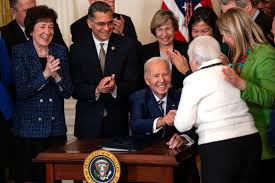Biden Expands Social Security Benefits for Retired Teachers, Public Workers
A new law ensures that police officers, teachers, and other public employees with pensions will now receive their full Social Security benefits.
President Joe Biden has officially expanded Social Security benefits for over 2 million Americans by signing a bipartisan bill into law during a ceremony at the White House. This legislation, which had received strong support from both parties in Congress, was passed late last year, with the House approving it by a vote of 327-75 in November and the Senate following suit with a 76-20 vote in December.

The signing ceremony, held on a Sunday, was significant not only because of the major policy change but also because it may be one of the last pieces of major legislation Biden enacts as president. With Republicans now controlling Congress and his term nearing its conclusion on January 20, when President-elect Donald Trump will be inaugurated, Biden’s ability to pass substantial bills is expected to be limited moving forward.
During the event, President Biden emphasized the positive impact the new law would have on retired public sector workers. “By signing this bill, we’re extending Social Security benefits for millions of teachers and other public employees, along with their spouses and survivors,” Biden declared. He highlighted that the law would provide an estimated average increase of $360 per month in benefits for those covered, calling it “a big deal.”
Additionally, the nearly 2.5 million people included under the expanded Social Security coverage will receive a retroactive lump-sum payment amounting to thousands of dollars. This payment is designed to compensate for the benefits they were unfairly denied in 2024 due to prior restrictions under the old system.
The legislation specifically addresses and repeals two controversial provisions that had long reduced Social Security benefits for certain public sector retirees: the Windfall Elimination Provision (WEP) and the Government Pension Offset (GPO). These rules had disproportionately affected teachers, firefighters, police officers, and other public workers, reducing the benefits they had earned after years of service and contributions to the Social Security system.
Maine Republican Senator Susan Collins, who was present at the signing ceremony, expressed her satisfaction with the repeal of these provisions. In a written statement, Collins described the law as a “victory for thousands of teachers, first responders, public servants, and the countless advocates who fought for years to correct this unfairness.” She pointed out that the WEP and GPO had for decades denied many retirees the Social Security benefits they were entitled to, despite their years of work and financial contributions.
Collins further emphasized that the new law ensures public service will no longer come at the expense of a retiree’s earned Social Security benefits.
Former U.S. Representative Abigail Spanberger, a Democrat who recently stepped away from Congress to pursue a run for Virginia governor, also praised the repeal of the provisions. Spanberger, who co-sponsored the House version of the bill in a previous Congress, shared on social media that eliminating WEP and GPO was long overdue. “Our retired police officers, firefighters, teachers, and public employees worked for DECADES to right this wrong,” she wrote, celebrating the legislation’s passage.
However, the expansion of benefits comes with a significant financial impact. The nonpartisan Congressional Budget Office (CBO) estimates the new law will cost approximately $195.65 billion over the next decade. This increase in spending is also expected to accelerate the insolvency date of the Social Security Old-Age and Survivors Insurance (OASI) trust fund by about six months.
CBO Director Phillip L. Swagel, in a letter to Senator Chuck Grassley, explained the financial implications, noting that under current law, the OASI trust fund is projected to be depleted during the fiscal year 2033. With the new legislation in place, the balance is anticipated to run out roughly half a year earlier.
Several members of Congress from both sides of the aisle attended the signing ceremony, underscoring the widespread bipartisan support for the bill. Among those present were Republican Senator Bill Cassidy of Louisiana, Democratic Senator Catherine Cortez Masto of Nevada, Democratic Senators Ron Wyden (Oregon), Amy Klobuchar (Minnesota), and Tina Smith (Minnesota). Republican Representative Mike Carey of Ohio, Democratic Representative Troy Carter of Louisiana, Republican Representatives Clay Higgins and Julia Letlow of Louisiana, and Democratic Representatives Marcy Kaptur (Ohio), Greg Landsman (Ohio), and Bobby Scott (Virginia) were also in attendance, according to the White House.
The bill’s signing marks a significant step toward correcting long-standing inequities in the Social Security system and expanding financial support for millions of retired public employees across the country.


Comments are closed, but trackbacks and pingbacks are open.